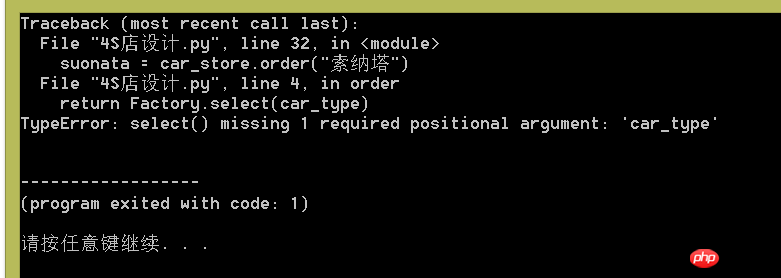code show as below:
# -*- coding:gb2312 -*-
class CarStore(object):
def order(self,car_type):
return Factory.select(car_type)
class Factory(object):
def select(car_type): #为什么这个地方的方法,没有self参数也可以运行?
if car_type == "索纳塔":
return Suonata()
elif car_type == "名图":
return Mingtu()
else:
print("没有您要的车型!")
class Car(object):
def move(self):
print("车在移动...")
def music(self):
print("正在播放音乐...")
def stop(self):
print("车在停止...")
class Suonata(Car):
def __init__(self):
print("索纳塔")
class Mingtu(Car):
def __init__(self):
print("名图")
car_store = CarStore()
suonata = car_store.order("索纳塔")
#car.move()
#car.music()
#car.stop()
suonata.move()Results of the:

This code itself has no problem and can be executed.
My question is why the seventh line of code def select(car_type): can be executed even though there is no self in this place? I remember when I was learning classes, I was taught that each method in the instance method must add a self parameter, but there is no parameter here. Then I added self here and made an error, as shown below: 
The result is an error:

Why is this happening?
巴扎黑2017-06-22 11:54:02
Are you using python3?
In python3, if the member function does not add self, it means that the function is a static member function and can be called directly using the form of "class name. function name (parameter)".
But if you add self, this function is a member function of the class. In other calling classes, it must be called like this: "Class name. Function name (self, parameter)", or implement an instance in the calling class, " Instance name. Function name (parameter)
Python3 is like this, my test, it is not in python2.
You added self in the select function, but when calling it in CarStore::order(), you used the form of "class name. function name (parameter)", so it is incorrect. When you call CarStore::order(), change it to "class name. Function name (self, parameter)" or implement an instance in CarStore::order(), using the form "instance name. Function name (parameter)" Try it.
I saw it last night, it was too late, so I tested it this morning.
PHP中文网2017-06-22 11:54:02
class Factory(object):
def select(car_type):
if car_type == "索纳塔":
return Suonata()
elif car_type == "名图":
return Mingtu()
else:
print("没有您要的车型!")According to this way of writing, select is an object method, and the call needs to be associated with an instance Factory(). When called, the object instance is bound to the first parameter car_type. This parameter name is generally agreed to be self, but it is not required.
You need to understand that the following two calling methods are different:
f = Factory()
f.select(xxx)
Factory.select(xxx)The first way, use the instance object to call, the first parameter car_type is automatically bound to the instance object f;
The second way, use the class to call, the first parameter (car_type) is not Binding; you need to bind it yourself to avoid errors - that is, the car_type you pass in: Factory.selct(car_type) this line.
However, when you add self, this function has two parameters, but you only bind car_type, which is bound to the first parameter self. The second one has no value, so it must be error.
What you have to do here is actually to implement select into a class method:
class Factory(object):
@classmethod
def select(cls, car_type):
if car_type == "索纳塔":
return Suonata()
elif car_type == "名图":
return Mingtu()
else:
print("没有您要的车型!")So, when called with Factory.select(car_type), cls is automatically bound to Factory, and car_type is bound to car_type.
The above, whether it is self or cls, are just agreed names, and what works is Python’s class-object-methodmodel.
It is recommended to read "Python Source Code Analysis" to at least understand how @classmethod works, otherwise you will not be able to write this type of code well.